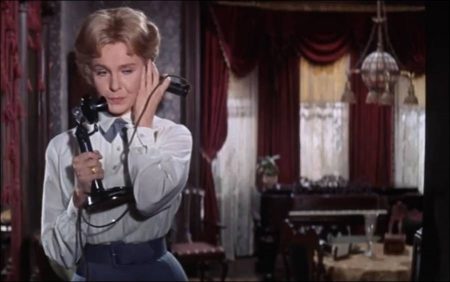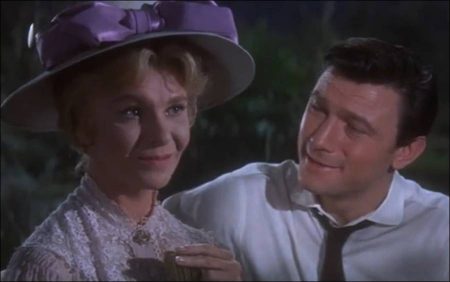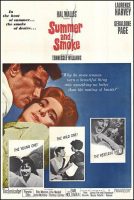Taglines: In the heat of summer… the smoke of desire…
Summer and Smoke movie storyline. Uptight single woman Alma Winemiller (Geraldine Page) carries a torch for the boy next door, who has grown up into dashing doctor John Buchanan Jr. (Laurence Harvey). An unabashed hedonist, John falls for the sensual Rosa Zacharias (Rita Moreno) and enjoys carefree nights out on the town, an approach to life that starkly contrasts with Alma’s reserved manner. While Alma attempts to come out of her shell, John also reconsiders his impulsive ways, leading to the possibility of romance.
Summer and Smoke is a 1961 American drama film directed by Peter Glenville, and starring Laurence Harvey and Geraldine Page, with Rita Moreno, Una Merkel, John McIntire, Thomas Gomez, Pamela Tiffin, Malcolm Atterbury, Lee Patrick, and Earl Holliman. Based on the Tennessee Williams play of the same name, it was adapted by James Poe and Meade Roberts. The story follows a young reserved girl who meets a doctor who lives on the wild side. They become friends, but their respective beliefs create difficulties for the relationship.
Film Review for Summer and Smoke
Loneliness, as much as love and desire, is a key theme in Tennessee Williams’ work. So it feels especially insightful that one of the many subtle strokes of Michael Wilson’s impeccably acted Hartford Stage production of “Summer and Smoke” is the relative isolation of its polar-opposite main characters.
Alma and John seem suspended like defiantly individual satellites in the outer orbits of their families, their respective suitors and seductresses, and the small-minded gossips who populate Glorious Hill, Miss. That sense of solitude, even in a crowd, draws them together and makes their failure to connect more wrenching, helping to smooth over the imperfections of an often problematic play.
Premiering on Broadway in 1948, the third part of Williams’ unofficial Southern trilogy was labeled an inferior revisitation of themes dealt with more effectively in “The Glass Menagerie” and “A Streetcar Named Desire.” It found wide critical favor only later in the 1952 Off Broadway revival with Geraldine Page, who subsequently re-created the role of Alma in Peter Glenville’s exceedingly precious 1961 film version.
The play has always been considered too schematic, its battle between soul and body, spiritual and physical, purity and pleasure too neatly encapsulated in the figures of the preacher’s daughter and aging small-town spinster, Alma Winemiller, and the handsome, hedonistic doctor’s son, John Buchanan Jr.

Much like the play’s principal symbolic elements, described in Williams’ exacting production notes — a stone angel fountain bearing the inscription “Eternity,” a doctor’s anatomical chart — Alma and John don’t appear to invite much interpretive nuance, and their role reversals can feel forced. John’s final-act transition in particular is often hard to swallow; Williams acknowledged that, despite repeated tinkering with the play, he never could make the young doctor entirely real.
This is the ninth installment in Hartford Stage’s decade-long Tennessee Williams cycle and the eighth directed by Wilson. It’s to the Hartford a.d.’s credit, and that of his superlative leads, Amanda Plummer and Marc Kudisch, that the delicate foundations of a substantiating bridge have been built between Alma and John, underscoring the poignancy of their awkwardly articulated attraction to one another — and rescuing them from unidimensional black and white.
Page’s Alma was a faded porcelain flower, as fluttery and tenuous in her grasp of reality as any of Williams’ emotionally stunted women. Plummer takes her cue less from Alma’s description of herself as “one of those weak and divided people who slip like shadows among you solid ones,” than from her subsequent line: “But sometimes, out of necessity, we shadowy people take on a strength of our own.”
Her Alma may have nervous spells and resort to pill-popping, but she has a fierceness that burns quietly inside her. As she humors her priggish minister father (Terry Beaver) or patiently tolerates her joyless sometime-beau Roger (Bill Kux), lashes out at the starchy bores in her intellectual salon or forcefully scolds her infantile mother (Jennifer Harmon), Plummer makes it clear her character is not another helpless invalid like Laura in “The Glass Menagerie.” It feels only fitting she should have grown up coveting the boy next door, seemingly the only person in town able to capture her starved imagination.
Kudisch also puts an intelligent stamp on his dissolute character; best known for smart comic turns in cartoonish roles in “Chitty Chitty Bang Bang” and “Thoroughly Modern Millie,” it’s a pleasure to see him play a chiseled hunk with a dark edge. Kudisch has relaxed charm and physical confidence to burn, but it’s the glimpses of depth beneath that surface smoothness, the unspoken longing, that so expertly lay the groundwork for John’s second-act turnaround. Not only is there no guarantee John will be happy with sunny, sweet Nellie (Marta Reiman), but in Kudisch’s soulful performance, he seems destined for a life of gnawing dissatisfaction.
Williams’ fascination with doomed romance and crushed desire is everywhere in his work. As played by Plummer and Kudisch, the aching sorrow of two people circling each other but never quite achieving alignment, identifying the missing element in themselves but failing to grasp it in time, is conveyed with acute sensitivity.
Wilson’s careful consideration of the text and the cast’s incisive characterizations are not matched by the design elements. Williams explicitly outlines his stylized set requirements of an expanse of blue sky with minimal details to suggest interiors. Tony Straiges follows these instructions to the letter, but the blond parquet platform, overhead latticework and sparse furnishings create an institutional, stagy feel that seems at odds with Wilson’s delicate balance of the lyrical and the naturalistic. But the acting is so exquisite that Williams’ irreconcilable conflict between spirit and flesh has rarely been so moving.
Summer and Smoke (1961)
Directed by: Peter Glenville
Starring: Laurence Harvey, Geraldine Page, Rita Moreno, Una Merkel, John McIntire, Thomas Gomez, Pamela Tiffin, Max Showalter, Earl Holliman, Malcolm Atterbury, Marjorie Bennett
Screenplay by: James Poe, Meade Roberts
Cinematography by: Charles Lang
Film Editing by: Warren Low
Costume Design by: Edith Head
Set Decoration by: Sam Comer, Arthur Krams
Art Direction by: Hal Pereira, Walter H. Tyler
Music by: Elmer Bernstein
MPAA Rating: None.
Distributed by: Paramount Pictures
Release Date: November 16, 1961
Visits: 140

